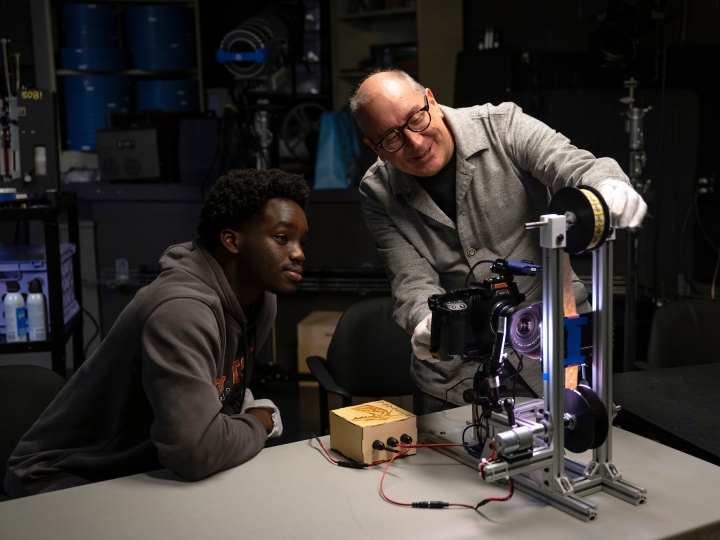New Scholarship Program Opens Doors to Transformational Learning
February 20, 2018
When does a student become a scientist?
Bucknell professors say it's often not when the student gets hired by a research company, or moves on to a Ph.D. program — they see undergraduates become scientists each and every year in their classrooms and research labs.
"When they begin, they are just students in a class," said Professor JiaJia Dong, physics & astronomy, "but when they start participating in research, and taking upper-level classes where the task is no longer to solve a homework problem but to discover something new, they start to identify themselves as part of the professional community. They start thinking, 'I'm a physicist,' 'I'm a chemist,' or 'I'm a geoscientist.' And there is a connection between that self-identification and success."
Find Your Path
Dong and her colleagues believe that every research opportunity at Bucknell immerses students deeper in the real-world professional culture of their field, and places them ahead of the curve when they enter the scientific community after graduation. But they also recognize that these research experiences aren't equally accessible to all students, especially those who need to work jobs unrelated to their studies to support themselves.
New NSF Grant Will Expand Access to Research
To open up transformational research experiences to more undergraduates, the professors began seeking ways to financially support students with the greatest need in the disciplines where they are least represented. Now, thanks to their efforts and a grant of just under $1 million from the National Science Foundation (NSF), more than 20 students in the fields of chemistry, geology & environmental geosciences, and physics & astronomy will receive the gift of time and space to explore, discover and become scientists.
Beginning in fall 2019, the new Physical Sciences Scholars program will provide scholarships of up to $10,000 per year, based on need, to exceptionally qualified students in these fields. The maximum scholarship should help reduce or eliminate the need for loans or work-study for recipients.
Dong will oversee the program with professors Karen Castle, chemistry, Mary Beth Gray '84, geology & environmental geosciences, and Katharyn Nottis, education, who retired last year but is lending expertise as a consultant. They believe that freeing students from financial constraints will enable them to devote further time to experiences like working in faculty labs and diving head-first into their own questions through concentrated summer research projects.
That's been the experience of Alexander Christensen '18, a physics major whose education is supported by the endowed Donald B. and Dorothy L. Stabler Scholarship Fund.
"My scholarship helps me focus on my passion rather than worry about money all the time," Christensen said. "The Bucknell physics department is filled with incredible people who love sharing the wonders of the universe with their students, and having extra help to be here working in such a fascinating field has been truly amazing."
Ongoing Support
Bucknell faculty and staff are also poised to provide further support for these students along every step of their educational journey.
Each cohort of scholarship recipients — the program will support 11 students per year in two consecutive years — will begin their studies together in Discovery College, a science-themed residential living-learning community.
The grant will also provide funding for each scholarship recipient to take part in a 10-week summer research experience, with free on-campus housing, a living stipend and lab space to pursue an investigation of their own interest. More than 20 faculty members have committed to advising at least one Physical Sciences Scholar's summer research project.
Along the way, Bucknell's Career Development Center will assist the students with specialized resources for career planning, internship opportunities and job hunting.
Enhancing Other Resources
The program joins other Bucknell efforts that make hands-on research experiences more accessible. These include the STEM Scholars, which supports a research-focused pre-orientation and a subsequent summer research experience for up to 20 new students annually; and the Clare Boothe Luce Scholars, which offers summer-research scholarships for women in the physical sciences, mathematics and engineering.
The organizers are also seeking to enhance those resources through the grant's research component: the professors hope to gather data about the positive impact that self-identification as a scientist and removing work-study requirements have for students.
"This project is going to help us better understand the needs of our students from lower-income backgrounds, and how we can better support them and help them be successful," Castle said.

